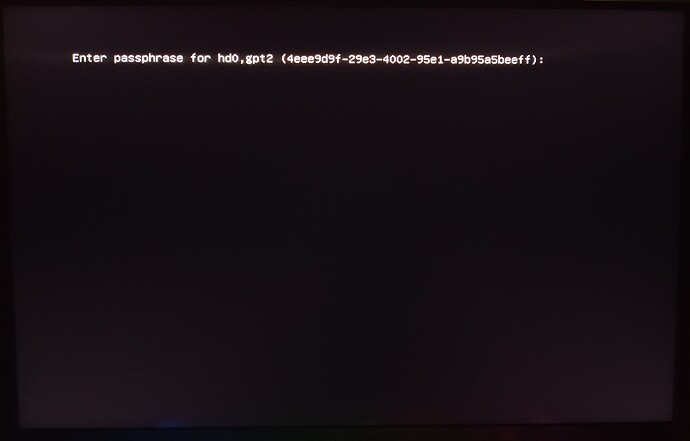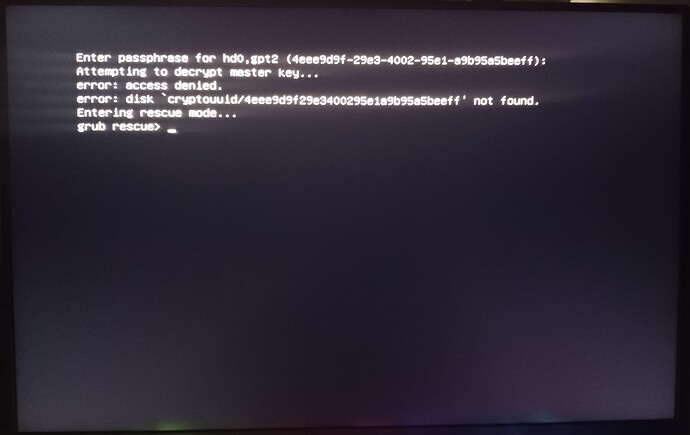My system info:
System:
Kernel: 6.5.5-1-MANJARO arch: x86_64 bits: 64 compiler: gcc v: 13.2.1
clocksource: tsc available: acpi_pm
parameters: BOOT_IMAGE=/boot/vmlinuz-6.5-x86_64
root=UUID=d2a55327-f83c-40b1-8b9a-bc1b1919926a rw quiet
cryptdevice=UUID=4eee9d9f-29e3-4002-95e1-a9b95a5beeff:luks-4eee9d9f-29e3-4002-95e1-a9b95a5beeff
root=/dev/mapper/luks-4eee9d9f-29e3-4002-95e1-a9b95a5beeff splash
resume=/dev/mapper/luks-560ef57a-391b-4666-a575-d79d2bd0f88f
udev.log_priority=3
Desktop: KDE Plasma v: 5.27.8 tk: Qt v: 5.15.10 wm: kwin_x11 vt: 2 dm: SDDM
Distro: Manjaro Linux base: Arch Linux
Machine:
Type: Laptop System: ASUSTeK product: ROG Strix G614JU_G614JU v: 1.0
serial: <superuser required>
Mobo: ASUSTeK model: G614JU v: 1.0 serial: <superuser required>
UEFI: American Megatrends LLC. v: G614JU.318 date: 07/28/2023
Battery:
ID-1: BAT0 charge: 89.1 Wh (100.0%) condition: 89.1/90.0 Wh (99.0%)
volts: 17.4 min: 16.0 model: AS3GYFG3KC R220358 type: Unknown
serial: <filter> status: full
CPU:
Info: model: 13th Gen Intel Core i9-13980HX bits: 64 type: MST AMCP
arch: Raptor Lake gen: core 13 level: v3 note: check built: 2022+
process: Intel 7 (10nm) family: 6 model-id: 0xB7 (183) stepping: 1
microcode: 0x119
Topology: cpus: 1x cores: 24 mt: 8 tpc: 2 st: 16 threads: 32 smt: enabled
cache: L1: 2.1 MiB desc: d-16x32 KiB, 8x48 KiB; i-8x32 KiB, 16x64 KiB
L2: 32 MiB desc: 8x2 MiB, 4x4 MiB L3: 36 MiB desc: 1x36 MiB
Speed (MHz): avg: 833 high: 1085 min/max: 800/5400:5600:4000 scaling:
driver: intel_pstate governor: powersave cores: 1: 800 2: 879 3: 977 4: 800
5: 800 6: 839 7: 800 8: 854 9: 974 10: 800 11: 1062 12: 1085 13: 800
14: 800 15: 816 16: 800 17: 800 18: 800 19: 800 20: 800 21: 800 22: 800
23: 800 24: 800 25: 800 26: 800 27: 800 28: 800 29: 800 30: 800 31: 800
32: 800 bogomips: 154880
Flags: avx avx2 ht lm nx pae sse sse2 sse3 sse4_1 sse4_2 ssse3 vmx
Vulnerabilities:
Type: gather_data_sampling status: Not affected
Type: itlb_multihit status: Not affected
Type: l1tf status: Not affected
Type: mds status: Not affected
Type: meltdown status: Not affected
Type: mmio_stale_data status: Not affected
Type: retbleed status: Not affected
Type: spec_rstack_overflow status: Not affected
Type: spec_store_bypass mitigation: Speculative Store Bypass disabled via
prctl
Type: spectre_v1 mitigation: usercopy/swapgs barriers and __user pointer
sanitization
Type: spectre_v2 mitigation: Enhanced / Automatic IBRS, IBPB: conditional,
RSB filling, PBRSB-eIBRS: SW sequence
Type: srbds status: Not affected
Type: tsx_async_abort status: Not affected
Graphics:
Device-1: Intel Raptor Lake-S UHD Graphics vendor: ASUSTeK driver: i915
v: kernel arch: Gen-13 process: Intel 7 (10nm) built: 2022+ ports:
active: eDP-1 empty: DP-1, DP-2, HDMI-A-1, HDMI-A-2 bus-ID: 0000:00:02.0
chip-ID: 8086:a788 class-ID: 0300
Device-2: NVIDIA AD107M [GeForce RTX 4050 Max-Q / Mobile] vendor: ASUSTeK
driver: nvidia v: 535.113.01 alternate: nouveau,nvidia_drm non-free: 535.xx+
status: current (as of 2023-09) arch: Lovelace code: AD1xx
process: TSMC n4 (5nm) built: 2022-23+ bus-ID: 0000:01:00.0
chip-ID: 10de:28e1 class-ID: 0300
Device-3: Sonix USB2.0 HD UVC WebCam driver: uvcvideo type: USB rev: 2.0
speed: 480 Mb/s lanes: 1 mode: 2.0 bus-ID: 1-8:4 chip-ID: 322e:2122
class-ID: 0e02
Display: x11 server: X.Org v: 21.1.8 with: Xwayland v: 23.2.1
compositor: kwin_x11 driver: X: loaded: modesetting,nvidia
alternate: fbdev,nouveau,nv,vesa dri: iris gpu: i915 display-ID: :0
screens: 1
Screen-1: 0 s-res: 1680x1050 s-dpi: 96 s-size: 444x277mm (17.48x10.91")
s-diag: 523mm (20.6")
Monitor-1: eDP-1 model: TL160ADMP03-0 built: 2022 res: 1680x1050 hz: 60
dpi: 124 gamma: 1.2 size: 345x215mm (13.58x8.46") diag: 407mm (16")
ratio: 16:10 modes: 2560x1600
API: EGL v: 1.5 hw: drv: intel iris drv: nvidia platforms: device: 0
drv: nvidia device: 1 drv: iris device: 3 drv: swrast surfaceless:
drv: nvidia x11: drv: iris inactive: gbm,wayland,device-2
API: OpenGL v: 4.6.0 compat-v: 4.5 vendor: intel mesa v: 23.1.8-manjaro1.1
glx-v: 1.4 direct-render: yes renderer: Mesa Intel Graphics (RPL-S)
device-ID: 8086:a788 memory: 22.55 GiB unified: yes
API: Vulkan v: 1.3.264 layers: 6 device: 0 type: discrete-gpu name: NVIDIA
GeForce RTX 4050 Laptop GPU driver: nvidia v: 535.113.01
device-ID: 10de:28e1 surfaces: xcb,xlib
Audio:
Device-1: Intel vendor: ASUSTeK driver: snd_hda_intel v: kernel
alternate: snd_sof_pci_intel_tgl bus-ID: 0000:00:1f.3 chip-ID: 8086:7a50
class-ID: 0403
Device-2: NVIDIA vendor: ASUSTeK driver: snd_hda_intel v: kernel
bus-ID: 0000:01:00.1 chip-ID: 10de:22be class-ID: 0403
API: ALSA v: k6.5.5-1-MANJARO status: kernel-api with: aoss
type: oss-emulator tools: alsactl,alsamixer,amixer
Server-1: JACK v: 1.9.22 status: off tools: N/A
Server-2: PipeWire v: 0.3.80 status: off with: pipewire-media-session
status: active tools: pw-cat,pw-cli
Server-3: PulseAudio v: 16.1 status: active with: 1: pulseaudio-alsa
type: plugin 2: pulseaudio-jack type: module tools: pacat,pactl
Network:
Device-1: Intel driver: iwlwifi v: kernel port: N/A bus-ID: 0000:00:14.3
chip-ID: 8086:7a70 class-ID: 0280
IF: wlo1 state: up mac: <filter>
Device-2: Realtek RTL8111/8168/8411 PCI Express Gigabit Ethernet
vendor: ASUSTeK driver: r8169 v: kernel port: 4000 bus-ID: 0000:6c:00.0
chip-ID: 10ec:8168 class-ID: 0200
IF: enp108s0 state: down mac: <filter>
Bluetooth:
Device-1: Intel driver: btusb v: 0.8 type: USB rev: 2.0 speed: 12 Mb/s
lanes: 1 mode: 1.1 bus-ID: 1-14:5 chip-ID: 8087:0033 class-ID: e001
Report: rfkill ID: hci0 rfk-id: 0 state: up address: see --recommends
RAID:
Hardware-1: Intel Volume Management Device NVMe RAID Controller Intel
driver: vmd v: 0.6 port: N/A bus-ID: 0000:00:0e.0 chip-ID: 8086:a77f rev:
class-ID: 0104
Drives:
Local Storage: total: 953.87 GiB used: 175.77 GiB (18.4%)
SMART Message: Unable to run smartctl. Root privileges required.
ID-1: /dev/nvme0n1 maj-min: 259:0 vendor: Micron model: 2400 MTFDKBA1T0QFM
size: 953.87 GiB block-size: physical: 512 B logical: 512 B speed: 63.2 Gb/s
lanes: 4 tech: SSD serial: <filter> fw-rev: V3MA003 temp: 43.9 C
scheme: GPT
Partition:
ID-1: / raw-size: 936.8 GiB size: 921.02 GiB (98.32%)
used: 175.73 GiB (19.1%) fs: ext4 dev: /dev/dm-0 maj-min: 254:0
mapped: luks-4eee9d9f-29e3-4002-95e1-a9b95a5beeff
ID-2: /boot/efi raw-size: 300 MiB size: 299.4 MiB (99.80%)
used: 37.6 MiB (12.5%) fs: vfat dev: /dev/nvme0n1p1 maj-min: 259:1
Swap:
Kernel: swappiness: 60 (default) cache-pressure: 100 (default) zswap: yes
compressor: zstd max-pool: 20%
ID-1: swap-1 type: partition size: 16.77 GiB used: 0 KiB (0.0%)
priority: -2 dev: /dev/dm-1 maj-min: 254:1
mapped: luks-560ef57a-391b-4666-a575-d79d2bd0f88f
Sensors:
System Temperatures: cpu: 38.0 C mobo: N/A
Fan Speeds (rpm): cpu: 2500
Info:
Processes: 500 Uptime: 26m wakeups: 2 Memory: total: 24 GiB note: est.
available: 23.1 GiB used: 5.14 GiB (22.2%) Init: systemd v: 254
default: graphical tool: systemctl Compilers: gcc: 13.2.1 clang: 16.0.6
Packages: 1467 pm: pacman pkgs: 1430 libs: 371 tools: pamac pm: flatpak
pkgs: 37 Shell: Zsh v: 5.9 default: Bash v: 5.1.16 running-in: konsole
inxi: 3.3.30
Normally i boot my system and reach the disk decryption screen:
Now if i enter the password correctly, press enter and i login to the system just fine.
If i failed to enter the password correctly, i get this screen:
Now i have to reboot to be able to enter the password and try again.
There are 2 problems here:
- The disk decryption screen is super ugly compared to the ones in Kubuntu or Fedora.
- If i entered the password incorrectly, i automatically enter “grub rescue” mode and have to reboot the system to try and enter the password again.
Thanks in advance for your help and support

